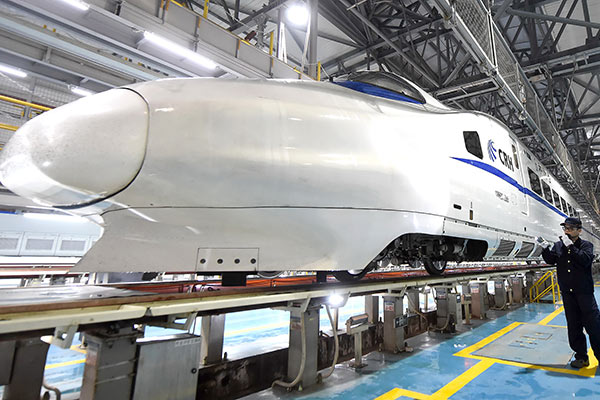 A technician checks a CRH train in Chongqing.(Photo/Xinhua) China released a three-year action plan to upgrade manufacturing sectors such as new materials, shipbuilding and railway vehicles to catch up with other established rivals in the world, the nation's top economic planner announced on Monday night. The National Development and Reform Commission released the three-year action plan (2018-20) for manufacturing business to stimulate growth points in key industries including high-speed trains, high-end vessels, offshore engineering equipment, industrial robots, new energy vehicles, new materials, biological medicine and medical devices. The country plans to achieve industrial production of key technological breakthroughs in major manufacturing industries by 2020, the NDRC said in a statement on its website. Eager to restore its earning ability, the country will also support and cultivate leading companies and famous brands, as well as internationally recognized industrial standards in these sectors by 2020, according to the plan. Sun Fuquan, a researcher at the Beijing-based Chinese Academy of Science and Technology for Development, said even though China has become a major player in the manufacturing sector, and has more than 110 companies in the Fortune 500 list, those firms are mainly in the banking and insurance, infrastructure, real estate and energy sectors, and their influence is mostly in the domestic market. In the railway equipment sector, the country plans to develop maglev trains with speeds of 600 kilometers per hour, automatic driving and signal systems for bullet trains, as well as freight trains with an operating speed at 160 kilometers per hour over the next three years. In areas vital to marine transportation, resource development and national defense, China will lay extra emphasis on developing the high-end vessels and offshore engineering product, including law-enforcement vessels, ultra-large container carrier, ships for polar expeditions and semisubmersible installations for the offshore oil and gas drilling sector. The country will be able to develop robots with autonomous programming, human-machine collaboration and dual-arm collaborative robots by 2020. Robots that can be used to carry, weld, spray paint and clean will be widely used in the automotive, metal processing, pharmaceutical and hazardous chemical sectors. The first demonstration base for the heavy equipment industry, consisting of users and companies for engineering design, research and development, manufacturing and examination will be set up soon. In addition, an innovation platform in the heavy equipment industry will also be built to accelerate the application of technological breakthroughs in the heavy equipment sector. "The country needs to ensure that the current, massive investment in technologies, including the internet, robotics and virtual reality, will be leveraged to the benefit of its industries-by linking those industries to scientists, engineers and entrepreneurs, and by bringing top talent close to the factories," said Shi Yong, vice-president of the Beijing-based China Machinery Industry Information Research Institute. |
Powered by Discuz! X3.4
© 2001-2013 Comsenz Inc.